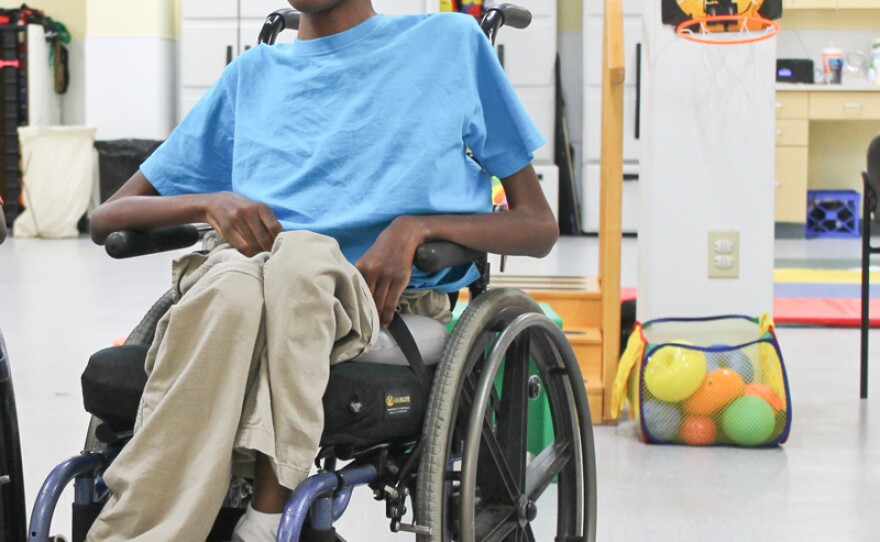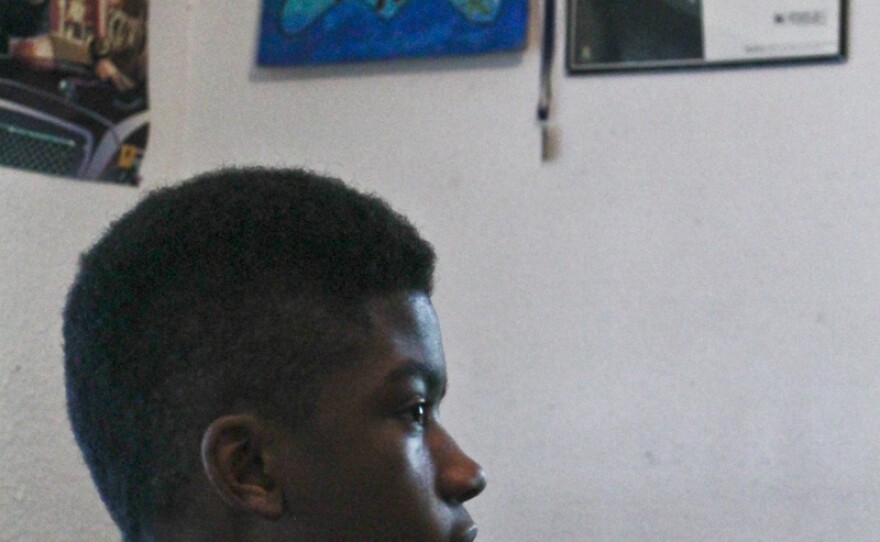Heading to high school is a challenge for any kid. There are new friends, new teachers and the normal ups and downs of being a teenager.
For 15-year-old Chance Hawkins, the road is even tougher. Chance has Duchenne muscular dystrophy, a genetic disease that causes muscle weakness and deterioration. It’s often fatal by age 25.
Still, Chance is an upbeat kid. He's one of the students we’re following from 8th grade through high school for the series Class of 17, part of KERA’s American Graduate initiative.
Like a lot of teenage boys, Chance Hawkins is spending the summer watching his favorite TV shows, playing video games and hanging out with family.
Twice a week, he also visits a pediatric rehab center for kids in his hometown of Fort Worth. Chance can’t move his body much and gets around in a wheelchair.
That's where physical therapist Nathan Morgan comes in.
Morgan lays Chance down on an elevated cushioned mat. He stretches parts of the boy's body and applies pressure in some areas. Chance rests his head on a multicolored bean bag. The therapy helps him feel more comfortable.
It’s not all business, though. On a recent afternoon, they talk about what Chance likes to read.

“It’d have to be a good comic book,” Chance says.
"What’s a good one?" Morgan asks.
"Captain Underpants."
The therapist looks puzzled.
"You never heard of that one?" Chance asks.
"Nuh uh," Morgan says.
"He’s like a big chubby dude with underwear on and a super cape."
Morgan laughs.
In the popular kids' book series, Captain Underpants is a superhero who empowers a pair of fourth graders. It’s no wonder that appeals to Chance. Duchenne muscular dystrophy affects 1 in 3,600 boys and is caused by a defective gene. Many patients lose the ability to walk by age 12.
In spite of all that, Chance stays positive.
"Chance is always funny. He’s always a good person to talk to," says Morgan. "I always feel like I’m hanging out with one of my friends when I’m with Chance."
Morgan says he doesn't see many patients like this one.
"It’s always enlightening to hear what he has to say and the way he outlooks life. And his sense of humor and positivity toward things. I know some things could get rough, but he handles everything really well and mature."
Lately, Chance has had a lot to handle. He's determined to graduate from high school, but he failed the STAAR test at Dunbar Middle School. His mom, Clarice Boyd, plans to meet with school officials in the coming days. For now, next semester is up in the air. Boyd says she wants him to attend a small school.
"He needs so much attention and help and he’s not going to say, 'Help me,' because he’s so independent," she says.
What's Chance looking for?
"Kids that need help don’t have to be in a big class where they feel scared to ask for help," he says. "And I would make it fun. Just a school just for you. You don’t gotta worry about nobody laughing.”
Chance is part of a big family. His 9-year-old brother, Louis Jr., also has the disease. The two go to physical therapy together. Mom wishes they could go to school together, too.
"That’s hard because each year it gets harder, whereas when they were just starting with the disease, it was OK," she says. "But now things are progressing, so I’m trying to get them in a place where they can be as comfortable as possible and still get an education at the same time."
Boyd’s been taking care of people her whole life. She helped raise two brothers who died from the same disease. Now, she teaches her kids to accept what they can’t change.
"God give us certain things in life that we either deal or we fold," she says. "It’s all based on how you take it and you live with it and how you make the best of it."
Back home, Chance’s older brother, Robert, helps him out of the van and into his motorized wheelchair. Robert, 16, doesn't have the disease and plays a big role in Chance's care. The two share a room, so every morning Robert is the one who helps Chance get dressed and out of bed.
In his wheelchair, Chance has a few minutes of independence as he controls the speed and direction along the driveway, up the porch ramp and into his home. The sound of a TV emanates from the living room where he's headed. He'll spend the rest of the afternoon watching one of favorite shows like Bernie Mac or playing the video game Madden NFL. Not thinking much about the road ahead.


















